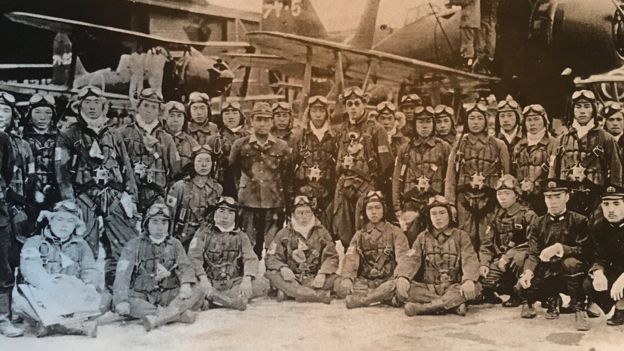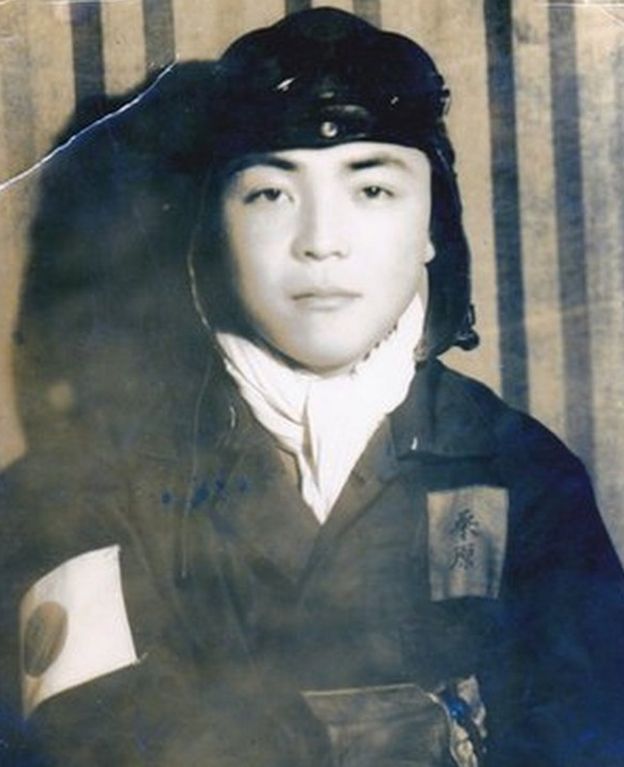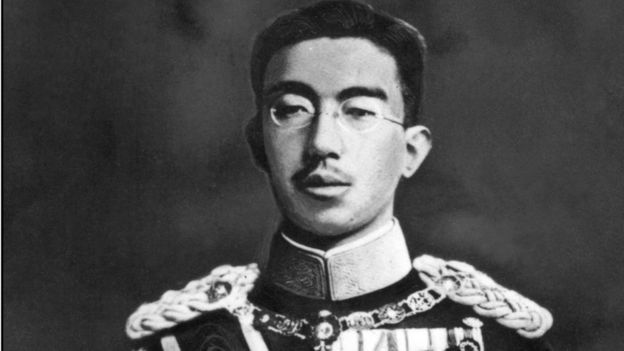How Japan's youth see the kamikaze pilots of WW2
During World War Two, thousands of Japanese pilots volunteered to be kamikaze, suicidally crashing their planes in the name of their emperor. More than 70 years on, the BBC's Mariko Oi asks what these once revered men mean to Japan's youth.
Irrational, heroic and stupid: this was what three young people in Tokyo said when I asked them about their views on the kamikaze."Heroic?" queried Shunpei, of his younger brother Sho's choice of word. "I didn't realise you were so right wing?"
It is difficult to verify the figures but it is believed that 3-4,000 Japanese pilots crashed their planes into an enemy target on purpose.
Only 10% of missions were believed to be successful but they sank some 50 Allied vessels.
 Image copyright Osamu Yamada
Image copyright Osamu Yamada "During the seven years of the Allied occupation of Japan, the kamikaze reputation was one of the first things that they went after," Prof MG Sheftall from Shizuoka University explained.
The suicidal tactic was portrayed as "insanity".
"But when the Allies left in 1952, the right wing nationalists came out strongly and they have carried out multi-generational efforts to seize back control of the narrative," he says.
"Even in the 1970s and 80s, the vast majority of Japanese people thought of the kamikaze as something shameful, a crime committed by the state against their family members.
"But in the 1990s, the nationalists started testing the water, seeing whether they could get away with calling the kamikaze pilots heroes. When they didn't get much push back, they got bolder and bolder," he added.
Would you fight for your country?
A survey of several countries in 2015 by Win/Gallup found that 11% of Japanese people would be prepared to fight for their country.- Pakistan: 89%
- India: 75%
- Turkey: 73%
- China: 71%
- Russia: 59%
- US: 44%
- UK: 27%
- Japan: 11%
In the 2000s, films such as For Those We Love and The Eternal Zero were released, portraying the kamikaze as just that - heroes.
But even Sho, the teenager who said they were heroic, admitted that his views had been affected by films and said that if Japan went to war tomorrow, he wouldn't be prepared to die for his country.
"It's because I cannot do it, " he said. "I find them heroic and courageous."
The result is hardly surprising given that Japan's post-war generation was brought up under a pacifist constitution which banned the nation from having a military.
'I didn't want to die'
But is it true that all kamikaze pilots, who were mostly aged between 17 and 24, were wholly willing to die for their country?When I spoke to two rare survivors, now in their 90s, the answer appeared to be no.
"I would say 60-70% of us were eager to sacrifice ourselves for the emperor, but the rest probably questioned why they had to go," 94-year-old Osamu Yamada told me at his home in Nagoya. Before he carried out his mission, the war ended.
"I was single at that time and had nothing holding me back so I had one genuine thought in mind and that is I must give myself up to defend Japan. But for those who had families, they must have thought very differently."
Keiichi Kuwahara, 91, was one of those who couldn't stop thinking about his family. He told me about the moment he was told to be part of the kamikaze unit.
"I felt myself going pale." He was only 17. "I was scared. I didn't want to die."
"I lost my father the year before, so it was only my mother and my older sister working to support the family. I was sending money to them from my salary. I thought, what will happen if I die? How will my family eat?"
So when his engines malfunctioned and he was forced to come back, he was relieved.
But on paper, Mr Kuwahara was considered to have volunteered. "Was I forced or did I volunteer? It is a difficult question to answer if you don't understanding the essence of the military," he said.
Prof Sheftall says the pilots were asked to put their hand up in a big group if they didn't want to volunteer. Amid peer pressure, hardly anyone was able to say no to the mission.
 Image copyright Keiichi Kuwahara
Image copyright Keiichi Kuwahara "I think the two are completely different," said Mr Kuwahara. "Kamikaze actions were taken only because it was wartime. With the so-called Islamic State the attacks are unpredictable."
Mr Yamada thinks the word kamikaze, which means "divine wind" in Japanese, is misunderstood and used inappropriately in English without understanding the historical context of what Japan was facing at the time.
"It hurts me because kamikaze was my youth. It was an innocent thing. It really was something pure. It was much more sublime. But now it is being discussed as if we were induced," he said.
After the war Mr Kuwahara, who had been reluctant about his mission, said he felt liberated and that he needed to think about how to rebuild the country.
But Mr Yamada took a while to adjust.
"I was disoriented, I felt powerless, I lost my sense of self, as if my soul was pulled out of me," he recalled.
"As kamikaze pilots, we were all prepared to die, so when I heard that we were defeated, I felt like the bottom had fallen out of my world."
It was the necessity to work, get food and survive in post-war Japan that kept him going.
And the very man he had been willing to die for, Emperor Hirohito, ultimately played a role in him moving on from the war because he set an example by shaking hands with the Americans.
 Image copyright Getty Images
Image copyright Getty Images For Japan's post-war generation, the experiences of former kamikaze pilots are unimaginable, even to their own family members.
"But when I think about his life, I notice that my life isn't mine alone," Mr Yamada's granddaughter Yoshiko Hasegawa told me. "I am obliged to live for those who could have been born as the children and grandchildren of the soldiers who died during the war."
Mr Kuwahara's grandson, meanwhile, is unaware of exactly what he went through as a 17-year-old trainee pilot.
"But that's the peaceful Japan I wanted to create," he smiled. To him, his grandson's ignorance is proof that the country has moved on from its painful past.



Ingen kommentarer:
Legg inn en kommentar
Merk: Bare medlemmer av denne bloggen kan legge inn en kommentar.